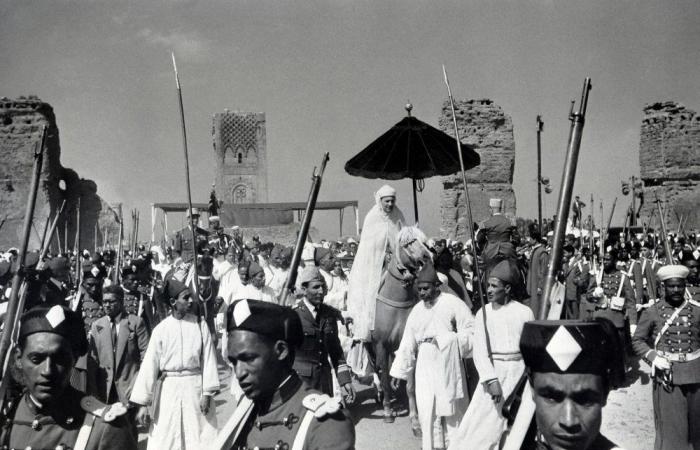The Moroccan people celebrate this Monday the 69th anniversary of independencea flagship event sealing the triumph of the fierce struggle of a King and a people to free themselves from the yoke of colonialism. The celebration of this event, which will remain forever engraved in the collective memory of Moroccans and in the annals of the modern history of the Kingdom, also constitutes an opportunity to pay tribute to the sacrifices made by the Alawite throne and the Moroccan people for the recovery of the independence and sovereignty of the Kingdom. It also allows rising generations to reflect on the efforts made since then for the development of the country and the strengthening of its infrastructures in all areas, and which have made Morocco a model to follow at the Arab and African levels in several areas. .
Indeed, freedom from the yoke of colonialism was only the beginning of another great epic, that of offering Moroccans the conditions for a dignified life while respecting their rights and freedoms. “We have moved from the battle of the little Jihad to that of the great Jihad,” declared the Sultan Sidi Mohammed Ben Youssefon November 18, 1955, upon his return from exile in the company of the Royal Family. This was the project launched from the first days of independence by the Father of the Nation, Late HM Mohammed V who, with unshakeable faith, iron determination and exemplary dedication to serving the cause of his people, was able to engage the Kingdom in a new era, marking the victory of law over injustice and dignity over servitude.
Chronology of significant events in the struggle for independence and modernization of Morocco
• November 6, 1955 – Signature of the La Celle-Saint-Cloud agreements: the French Minister of Foreign Affairs, Antoine Pinay, and Sidi Mohammed Ben Youssef signed the La Celle-Saint-Cloud agreements. These agreements provide for the return to the Throne of Sidi Mohammed Ben Youssef and the Independence of Morocco, marking a decisive turning point in the fight for national sovereignty.
• November 16, 1955 – Triumphant return of HM Mohammed V to Rabat: ten days after the signing of the agreements, Sidi Mohammed Ben Youssef returned triumphantly to Rabat. This return symbolizes the end of the Sultan’s exile and the beginning of the transition to Independence. The Moroccan people celebrate this event as a historic victory against colonialism.
• November 18, 1955 – Beginning of the era of Independence: during the Speech from the Throne, the late HM Mohammed V officially proclaimed the liberation of Morocco from the colonial yoke. Although independence was not officially declared until March 2, 1956, this date marked the Kingdom’s entry into a new phase. The Sultan announces: “We are delighted to be able to announce the end of the tutelage regime and the protectorate and the advent of an era of freedom and independence.” HM Mohammed V also underlines the importance of cooperation with France in a spirit of understanding and fruitful partnerships to ensure a peaceful transition. The first orientations for a modern State: in his Speech from the Throne, the late HM Mohammed V outlined the broad outlines of a constitutional reform based on the creation of a State of law. The Sultan declares: “Our objective is the constitution of a responsible and representative Moroccan government, an authentic expression of the will of the people”. These orientations include democratization, multi-partyism and the establishment of a modern and inclusive governance system.
• 1956 – Official declaration of independence: on March 2, 1956, the independence of Morocco was officially declared. The Kingdom is beginning a major political and administrative transformation to break with the legacy of the protectorate.
• 1959 – Establishment of a modern administrative system: The late HM Mohammed V engaged Morocco in a process of administrative modernization. Decentralization, deconcentration and regionalization are becoming major axes of this reform. In 1959, the Kingdom established 800 basic local authorities, a pluralistic elective system for municipal councils, and direct universal suffrage.
These key stages mark not only the liberation of the Kingdom, but also the desire of the Father of the Nation to lay the foundations of a modern and democratic State.
His Majesty King Mohammed V, the Father of the Nation
Mohamed Ben Youssef was proclaimed Sultan of the Sherifian Kingdom in 1927. France will limit the prerogatives of the Sherifian central power by proceeding more and more through direct management. Resistance to the protectorate will gradually organize itself, consisting mainly of young urban elites. The Second World War will mark a truce between the nationalist opposition and France. During the war, the Sultan of the Sherifian Kingdom, considering himself protector of all his subjects, opposed the Vichy regime and fiercely defended the cause of Moroccan Jews. In 1944 the Independence Manifesto was proclaimed. Three years later, on April 10, 1947, Sidi Mohammed gave a speech in Tangier (international city) in which he directly expressed his desire to see Morocco reunified and independent. During the five years that followed, negotiations with France led to nothing and, in 1952, the crisis between the authorities of the protectorate and the nationalists led to insurrectional movements. The Sultan will be deposed, then exiled along with the entire Royal Family to Madagascar in 1953.
Tens of thousands of Moroccans took to the streets to demonstrate their rejection of the occupier’s policies. These events gave rise to what Morocco still celebrates today every August 20: the revolution of the King and the people. The Sovereign’s return from exile took place in November 1955 to pave the way to independence, recognized in 1956 by France, then by Spain. In 1958, in a historic speech to M’hamid El-Ghizlane, addressing the sheikhs and representatives of the Sahrawi tribes who came to pledge allegiance to him – the Beïa -, HM Mohammed V recalled the historic and legitimate rights of Morocco over its Sahara . He declared in substance: “We solemnly proclaim that we will continue our action for the return of our Sahara, within the framework of respect for our historical rights and in accordance with the will of its inhabitants…”. From the earliest years, HM Mohammed V undertook to provide the country with democratic institutions and drafted a Constitution shortly before his death in 1961.






